MARINE ecologist Jess Melbourne-Thomas seems to keep being made the public face of her field, something the 38-year-old Hobartian finds quite amusing.
She is currently featured on a giant billboard above Hobart’s busy ABC Roundabout, two years ago her face was turned into a constellation and projected onto the ceiling of New York’s Grand Central Station, and she has just been named Tasmanian Australian of the Year.
MARINE SCIENTIST IS TASMANIA’S AUSTRALIAN OF THE YEAR
Her head full of long blonde dreadlocks and beaming smile have made her a striking and easily recognisable figure for many years in Tasmania’s scientific community. But when I ask her about that UTAS billboard in Hobart, she laughs, saying nobody would recognise her from it. and not just because of the diving mask and full scuba gear she is wearing in the photo.
“I still had my dreads in that photo and they’re gone now! I’d had them for 16 years and they’d become this huge part of my identity but one morning I was driving home from somewhere, I remember the baby was asleep in the car, and realised I’d had enough of them.
“They kept getting frozen when I was in Antarctica, I could never fit them under a beanie, they had to go. So I called Mum and asked her to chop them off for me and it was done. My head feels lighter now.”
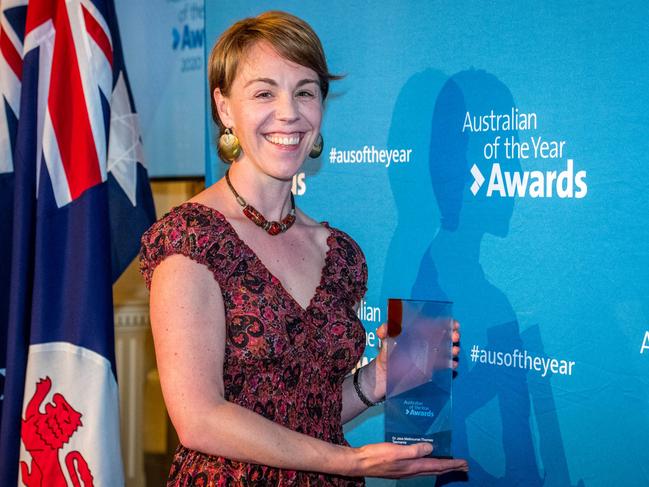
The dreads might be gone but Dr Melbourne-Thomas seems destined to remain in the spotlight as one of the state’s most famous scientific figures for some time to come.
She won Tasmania’s Australian of the Year award this month in recognition of her female leadership advocacy and work in the field of marine sustainable development with CSIRO Oceans & Atmosphere, where she uses an interdisciplinary research approach to understand how marine socioecological systems respond to climate change and other human activities.
Her current primary role at CSIRO in Hobart is as a transdisciplinary researcher and knowledge broker, meaning a large part of her job is taking the latest research coming out of the institution and making it understandable and clear for the general public as well as politicians and policymakers.
“One of the big challenges for scientists, particularly ecosystem scientists, is that you are studying some quite complex systems and as you add in more factors like human impact, biology and physics, it only get more complicated.
“So translating and communicating what we understand about those systems is difficult. My role is to try and connect the dots and deliver messages to non-scientists and other stakeholders in a way that means they can be usefully acted upon.”
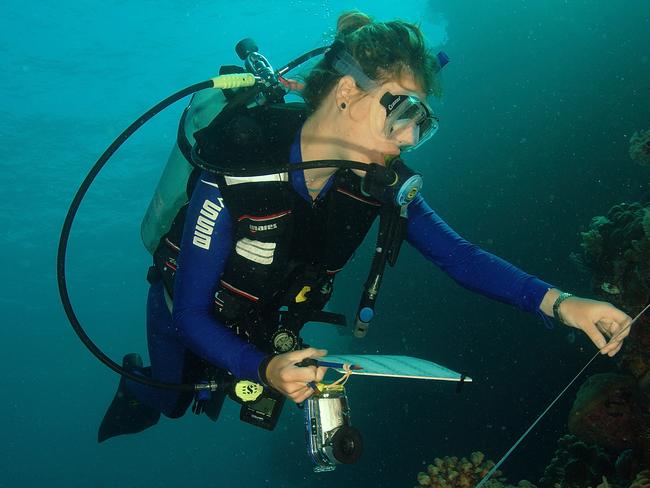
Growing up at Fern Tree at the base of kunanyi/Mt Wellington, Melbourne-Thomas spent a great deal of her life playing outside and doing outdoor activities with her family, including bushwalking and scuba diving. She says being close to nature from such an early age was a big motivator in steering her towards a career in marine and ecological sciences.
“Given the amount of time we spent as a family in the Tasmanian wilderness and diving off the East Coast, I think it was pretty natural to be interested in those systems,” she says.
“We grew up snorkelling as kids and my dad says he used to hold us by our ankles and dunk us in rock pools with our masks on. Later I learnt to scuba dive in the kelp forests of the East Coast with my dad and my brother [Rowan Trebilco], who is also a marine scientist now. “But over time I’ve noticed significant changes in some of those environments, compared to how they looked when I was a kid. Most of those kelp forests have disappeared now because the water temperature has risen too much for them. That’s the reality of how fast this is happening, that I’ve seen those changes in my own lifetime. I’ve studied coral reefs and seen the sheer scale of coral bleaching and it makes me sad that my kids will never see the Great Barrier Reef looking the way it did when I dived there.”
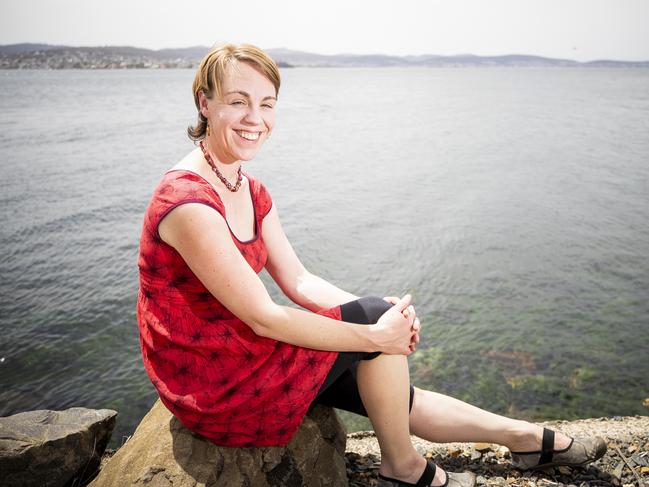
In 2003, after doing her undergraduate degree at the University of Tasmania, the former Friends’ School student was awarded a Rhodes Scholarship, allowing her to travel to Oxford University in the UK to do her doctorate in marine biology. She spent two years working on her PhD at Oxford but in typically self-deprecating fashion, Dr Melbourne-Thomas glosses over the illustrious aura and reputation of Oxford to make a joke at her own expense.
“I’m an Oxford dropout,” she laughs. “I started my PhD there and got part way through it but didn’t finish it. I realised it was a very hands-off way of teaching there and you were expected to do your own thing without a lot of guidance and I think maybe I needed a little more hand-holding at that time.
“Also it was going to take five years to do my PhD and the Rhodes Scholarship was only three years of funding, so I was looking at a huge debt if I finished my doctorate there. So in the end I made the really difficult decision to come back to Tassie.”
She does not regret her time spent at Oxford, though, saying the experience taught her a great deal and set her firmly on the path she followed for the rest of her career. She was studying coral reef science, which meant spending as much time doing field work in Indonesia as she did studying at Oxford and it was while in Indonesia that she met her husband, James Melbourne-Thomas, also a scientist and diver.
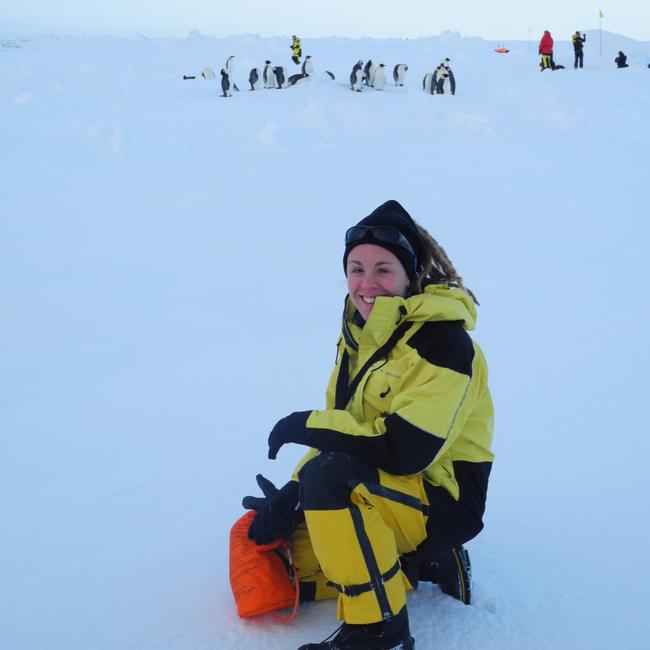
Returning to Tasmania, she completed her PhD at UTAS but says it took a minor career crisis to bolster her confidence again. “When I came home I was working in a local dive shop and wondering whether I was really suited to a career in science at all.
“Then one day it just happened that a mentor, who was important to me in my undergrad career, came into the shop, asked what I was doing and gave me a really good pep talk. So I ended up doing my PhD at UTAS. It meant starting over but it was in a related field, marine ecosystem modelling.
“I worked in the Philippines and Mexico as part of a coral reef targeted research program creating mathematical models as tools for coral reef management. It was a great intro into how models can help inform management approaches for marine ecosystems and it led to using models in the same context for Southern Ocean ecosystems.”
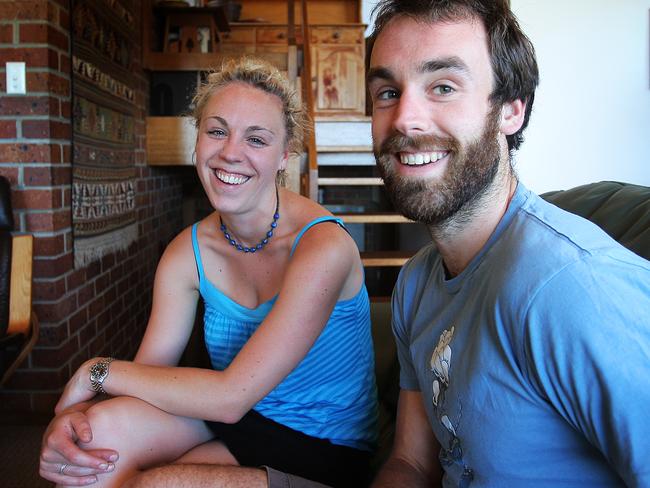
The other important lesson Dr Melbourne-Thomas learnt while at Oxford was seeing just how male-dominated the sciences still are, especially within the hallowed halls of such an ancient institution. And this realisation set her on a path to correct that balance, not only as a matter of equality, but in the best interests of future scientific research and innovation.
“Oxford was an eye-opening experience, for sure. I felt like I didn't fit in there and, looking back, I suspect part of it might have been that it was still a fairly male-dominated place in terms of senior people in various departments. I met a lot of wonderful people and it opened a lot of doors for me, so I don’t regret it at all, but I think a big part of the difficulty I had there was that there was a distinct lack of female role models.”
In 2014 Dr Melbourne-Thomas co-founded the Homeward Bound project for women in science and leadership, aimed at building a network of women working in science and providing leadership journeys and workshops to help create new ideas.
“I have learnt a lot through being engaged with that program. Things like making female scientists more visible in the media and challenging the stereotypes around what a scientist looks like and providing role models for young women entering science careers. Some changes are happening but I’m concerned they’re not happening fast enough. There is the issue of the leaky pipeline for one thing, where women tend to disappear from the field before they’ve risen to the leadership roles. That kind of thing requires institutional change and it’s not time to give up the fight just yet.”
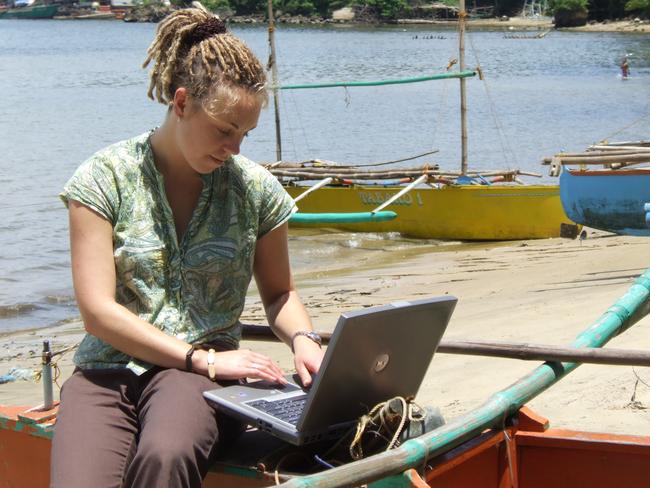
Improving opportunities for women to enter and remain in the sciences is a bigger issue than equality alone. A diversity of voices in science is vital.
“My message that I’ve been working towards is that if we are going to address these big worldwide problems around the environment, I believe we need diversity in science and at the leadership table. There is a huge amount of evidence that shows increased diversity in teams leads to better outcomes. So when it comes to climate change in particular, we need new ways of thinking and new voices to solve these problems and we simply can’t afford to have half the voices missing.”
Dr Melbourne-Thomas believes we also need to expand the cultural diversity of voices in the scientific community.
“I’ve been reading a lot recently about how we can learn from indigenous and traditional knowledge-holders, how they think about sustainability and conserving biodiversity.
“I went to an exciting workshop about the future challenges affecting the oceans, and traditional and indigenous knowledge-holders from around world were invited to share their knowledge and perspective. I found that incredibly eye-opening, such fundamentally different ways of engaging with the environment. New reports are showing areas with more indigenous land management practices have better outcomes in terms of biodiversity, so we really need that input in order to face the challenges ahead.”
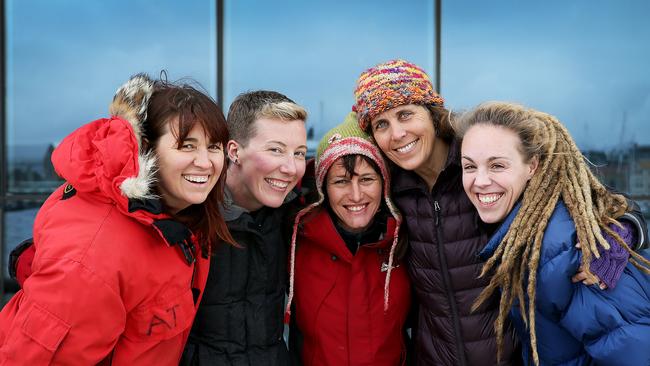
With all the big achievements in her career, it is unsurprising Dr Melbourne-Thomas was named one of 12 famous female scientists to be featured as part of General Electric’s Balance the Equation Initiative in 2017. This tribute involved an art installation that rendered the faces of the 12 scientists as constellations and projected them on the ceiling of Grand Central Station in New York City. The Tasmanian scientist is still amused by the idea, bursting into laughter at the first mention of it.
“I still don’t quite know how they came to pick me, I think maybe they came across me through Homeward Bound. They invited me to fly over and see it in person but I didn’t go. I had a small baby at the time and it was just too difficult. It was an outline picture of my face in stars and from the pictures I saw, it was quite impressive. It ran for about two weeks, it was quite an honour.”
But what is more important to Dr Melbourne-Thomas than accolades is the hope that she can leave the world a better place for her girls, one-year-old Marli and three-year-old Eila. She now lives at Neika, five minutes from where she grew up, and it is important to her that her children enjoy the quality of life she did.
“Seeing these extreme fire events at the moment brings home the reality that this will be part of the future for kids in Australia. I was lucky to have a great relationship with the environment as a kid and had so many opportunities to enjoy it, but climate change is a threat to that. The most common thing I encounter around trying to communicate information about climate change is the public feeling a bit confused about what they can do in their day-to-day life to help make a difference.
“People sometimes feel helpless because they think they need to make huge changes, but a million changes made imperfectly will still make a huge difference. So I hope being Tasmanian Australian of the Year will be an opportunity for me to convey that message as widely as I can.”
Dr Jess Melbourne-Thomas will represent Tasmania at the 2020 Australian of the Year Awards in Canberra on January 25.

Add your comment to this story
To join the conversation, please log in. Don't have an account? Register
Join the conversation, you are commenting as Logout
Meet the talented Tasmanians keeping traditional arts alive
In a world often dominated by consumerism and mass-production, these four talented Tasmanians are finding creative success in traditional arts while also showcasing Tasmania to the world
Conflict crossfire: Is it really safe to fly to Europe via Middle East?
Thousands of Aussies are primed to take off for the European summer but with an unpredictable and volatile situation unfolding in the Middle East, is it really safe to fly over the region?